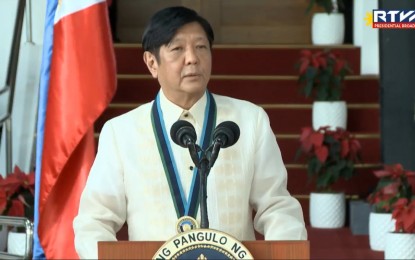
President Ferdinand R. Marcos Jr. (File photo)
MANILA – The International Criminal Court (ICC) may visit the Philippines, but the government will not cooperate in the international tribunal’s investigation into the country’s war on illegal drugs, President Ferdinand R. Marcos Jr. said Tuesday.
Marcos made the statement, following reports that ICC investigators were able to gather information and evidence for a possible case of crime against humanity against former president Rodrigo Duterte and other personalities linked to the drug war of the previous administration.
“Let me say this for the 100th time. I do not recognize the jurisdiction of ICC in the Philippines. I consider this as a threat to our sovereignty. Therefore, the Philippine government will not lift a finger to help any investigation that the ICC conducts,” he said in a media interview on the sidelines of an event in Quezon City.
“However, as ordinary people, they can come and visit the Philippines, pero hindi kami tutulong sa kanila (but we will not help them),” Marcos added.
Marcos said the government is keeping an eye on the ICC to make sure that it would “not come into contact with any agency of government."
He added that he has already instructed all government offices, including law enforcement agencies and local government units, to evade any queries of the ICC, in case it tries to contact them.
“We do not recognize your jurisdiction. Therefore, we will not assist in any way, shape, or form, in any investigation that the ICC is doing in the Philippines,” Marcos said.
In a forum in Quezon City on Sunday, former senator Antonio Trillanes IV said he anticipates the issuance of a warrant of arrest against Duterte and other respondents in the ICC’s investigation into the war on drugs launched by Marcos’ predecessor.
This, as Trillanes cited an “inside information” that ICC investigators allegedly visited the country in December last year and were able to interview and complete gathering information on Duterte and other individuals involved in the drug war.
In July last year, Marcos said the Philippine government would no longer get in touch with the ICC after rejecting its plea to suspend its investigation into Duterte’s anti-narcotics campaign.
The Philippines formally cut ties with the ICC on March 17, 2019.
Meanwhile, the Department of Justice (DOJ) said it is taking a consistent stance on matters pertaining to the ICC.
In a statement, the DOJ said that "having withdrawn from the ICC, the Philippines has no legal duty to comply with any obligations or proceedings thereunder."
"As a sovereign nation with a robust and functional justice system capable of addressing internal issues without external interference, the Philippine government has shown that it is ready, willing, and able to investigate and prosecute any crime committed within its territory. As such, any presence of international bodies, such as the ICC, within our jurisdiction must be in accordance with our Constitution and relevant laws. Prior consent and approval of relevant Departments, including the Department of Foreign Affairs (DFA), Department of the Interior and Local Government (DILG), and the DOJ must be obtained before any foreign entities can conduct official activities within our territory," it said.
As of today, the DOJ said it has not received any official communication or confirmation regarding the presence of the ICC within the country.
Specifically, it said it has not received any advisory from the DFA that the ICC has indeed entered the Philippines, "a requirement that would trigger the interdepartmental coordination concerning developments that go to the very core of our sovereignty and the primacy of our Constitution and our laws."
"The DOJ is fully aware of the Supreme Court’s ruling in Pangilinan et al. vs. Cayetano et al. (G.R. No. 238875) pertaining to supposed crimes committed before the withdrawal of the Philippines from the ICC. We note that the ruling was a mere obiter dictum or the court’s incidental expression of opinion not essential to the decision and not establishing precedent.
The DOJ is committed to upholding the principles of justice and the rule of law. The protection of the rights of our people regardless of color, race, beliefs, or creed remains and continues to be the cornerstone of our mandate.
“Gumagana ang sistema natin. Our system works. Hindi namin papabayaan and mga biktima. Ipagtatanggol natin ang karapatan ng bawat Pilipino (Our system works. Our system works. We will not neglect the victims. We will defend the rights of every Filipino),” DOJ Secretary Crispin Remulla said.
For his part, Solicitor General Menardo Guevarra reiterated that the Philippine government has already disengaged from the ICC.
“The Philippines has disengaged completely from the ICC. As the President has repeatedly declared, the ICC has lost jurisdiction and any continuing investigation by the ICC is a threat to the country's sovereignty. The Philippine government will therefore not lend any assistance to the ICC investigation, much less in the enforcement in Philippine territory of any processes issued by the ICC," Guevarra said.
"I repeat my admonition to all those who have legitimate complaints about any abuses committed during the war on drugs: our own national institutions are ready to investigate and prosecute all those who have violated the law,” he added. (With a report from Benjamin Pulta/PNA)
